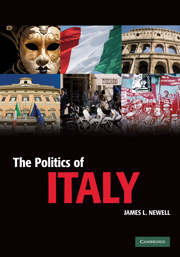Book contents
- Frontmatter
- Contents
- List of figures
- List of maps
- List of tables
- List of boxes
- Acknowledgements
- List of abbreviations
- Chronology
- Map 1 Italian regions and major cities
- Introduction
- I Historical background
- II The polity: structures and institutions of the regime
- III Politics: citizens, elites and interest mediation
- IV Policies and performances
- Appendix: The electoral system for the Chamber of Deputies and the Senate
- References
- Index
Appendix: The electoral system for the Chamber of Deputies and the Senate
Published online by Cambridge University Press: 05 August 2012
- Frontmatter
- Contents
- List of figures
- List of maps
- List of tables
- List of boxes
- Acknowledgements
- List of abbreviations
- Chronology
- Map 1 Italian regions and major cities
- Introduction
- I Historical background
- II The polity: structures and institutions of the regime
- III Politics: citizens, elites and interest mediation
- IV Policies and performances
- Appendix: The electoral system for the Chamber of Deputies and the Senate
- References
- Index
Summary
Law no. 270, of 21 December 2005, introduced a series of amendents to the laws governing elections to the Chamber of Deputies and the Senate of the Republic. The nature of these amendments were such as to alter substantially the basis on which seats in the two chambers of Parliament had been distributed since the electoral-law reform of 1993. As a consequence, the details of the electoral system for each branch are now as follows.
The Chamber of Deputies
The country is divided into twenty-six constituencies among which 617 of the 630 seats are assigned according to the population of each constituency.
Parties field a list of candidates for each constituency, voters making a single choice among these lists. That is, the voter chooses a list but cannot choose between the candidates making up the chosen list.
In presenting their lists, parties may either declare themselves to be independent entities or, with the consent of the parties concerned, declare themselves to be allied with others as part of a coalition.
[…]
- Type
- Chapter
- Information
- The Politics of ItalyGovernance in a Normal Country, pp. 352 - 357Publisher: Cambridge University PressPrint publication year: 2010

